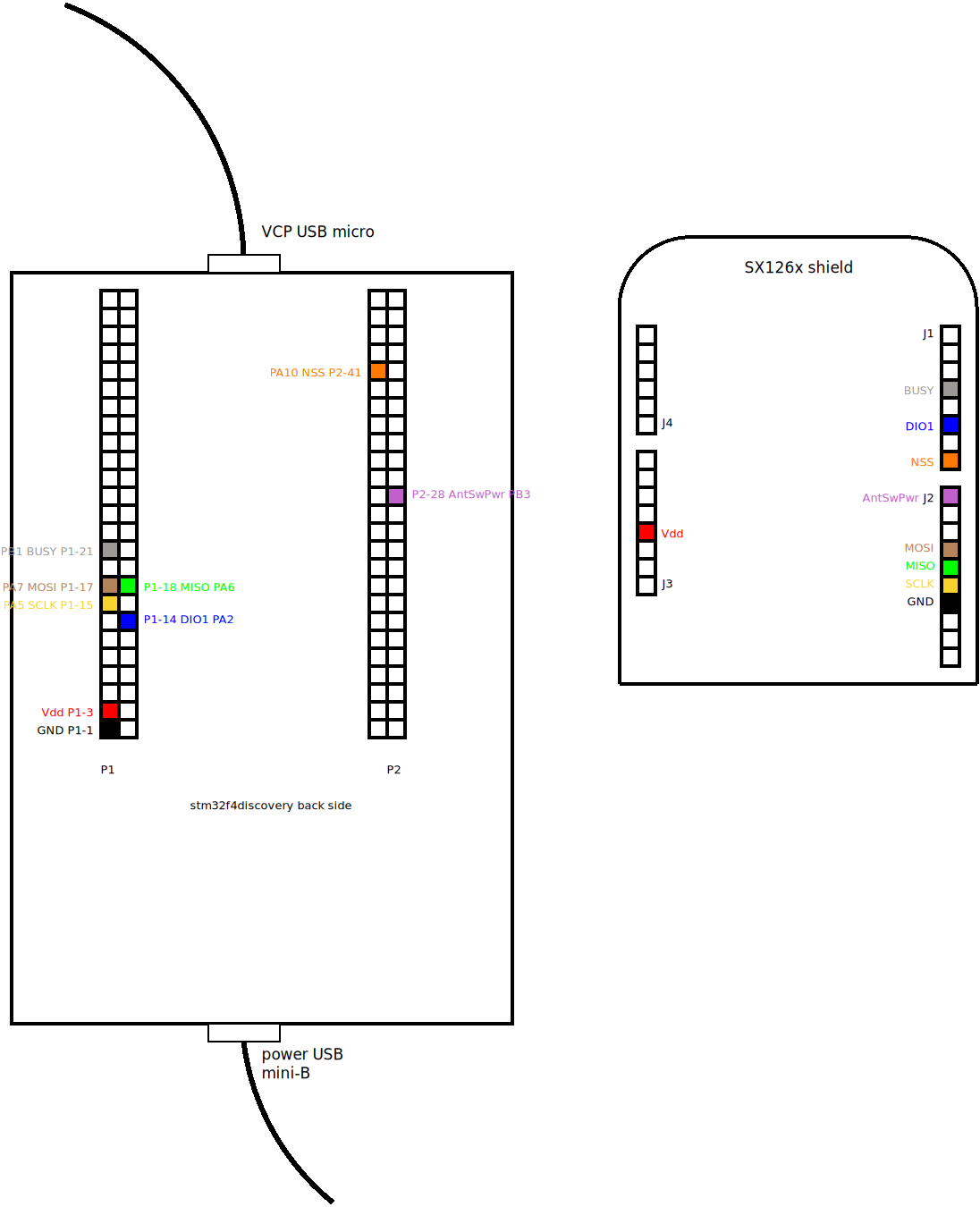- passthru: for checking stm32f4-discovery hardware, microphone and speaker interface. Requires only one discovery board. Useful for anybody wishing to use this board for audio purpose.
- vocoder_passthru: adds vocoder to passthru test using single discovery board: For checking codec2 from microphone encoding directly decoding out to speaker. This doubles CPU power required since both encoding and decoduing must be done for each frame.
- lora_codec2: adds SX1262 radio, half duplex transceiver. Requires two discovery boards, each with its own sx1262. PTT is blue button (push to talk)
After cloning this repository:
$ cd codec2
$ git submodule init
$ git submodule update
Follow tool install instructions here: steps 2 and 4 for toolchain and peripheral library
(from root directory of this project)
$ mkdir build
$ cd build
$ cmake .. -DCMAKE_TOOLCHAIN_FILE=../codec2/stm32/cmake/STM32_Toolchain.cmake -DPERIPHLIBDIR=/opt/STM32F4xx_DSP_StdPeriph_Lib_V1.8.0/
$ make
Select codec2 bit-rate: uncomment the line in CMakeLists.txt:
#target_compile_definitions(lora_codec2 PRIVATE -DCODEC2_MODE=CODEC2_MODE_<bitrate>)
Select desired LoRa bandwidth on the line defining LORA_BW_KHZ in CMakelists.txt. Spreading factor will be selected appropriate for the vocoder bit-rate and LoRa bandwidth selected. Spreading factor functional range is 5 to 12. See file loRa_codec2/main.h where spreading factor is defined according to codec2 bitrate vs LoRa bandwidth.
for execution logs, define ENABLE_VCP_PRINT in CMakeLists.txt, however the micro-usb cable must be connected and a serial terminal program running on the PC to take the characters, or the program will halt waiting for characters to send on VCP. Disable this feature when you do not wish to connect the micro-usb cable.
Flashing stm32f4-discovery
https://github.com/texane/stlink
providing address isnt needed when using st-flash with .hex files
i.e:
st-flash --format ihex write lora_codec2.hex
Instead, you may also simply copy the .bin file from the build to the USB flash drive thru the mini-B USB on the stm32f4-discovery.
| codec2 mode | samples per frame | encoded bytes per frame | frames per lora packet | LoRa packet length bytes | LoRa BW KHz | LoRa SF | air-time used percent | packet duration (ms) |
|---|---|---|---|---|---|---|---|---|
| 3200 | 160 | 8 | 16 | 128 | 500 | 10 | 96 | |
| 2400 | 160 | 6 | 16 | 96 | 500 | 10 | 77 | 237 |
| 1600 | 320 | 8 | 8 | 64 | 500 | 10 | 56 | |
| 1600 | 320 | 8 | 16 | 128 | 500 | 11 | 86 | 555 |
| 1400 | 320 | 7 | 16 | 112 | 500 | 11 | 77 | 493 |
| 1300 | 320 | 6.5 | 8 | 52 | 500 | 11 | 90 | 288 |
| 1200 | 320 | 6 | 16 | 96 | 500 | 11 | 71 | 452 |
| 1200 | 320 | 6 | 32 | 192 | 500 | 11 | 62 | 1281 |
| 700C | 320 | 3.5 | 16 | 56 | 250 | 11 | 96 | 576 |
| 450 | 320 | 2.25 | 16 | 36 | 250 | 11 | 71 | 453 |
LoRa data rate selection is only possible in steps by a factor of two. Codec2 bit-rate change will affect LoRa packet duty cycle. When duty cycle is under 50%, the LoRa data-rate can be reduced (bandwidth reduced or SF increased). If packet duty cycle is over 100%, then LoRa data-rate must be increased to faster. Typical 2.5 to 2.7dB change in link budget for each step of LoRa data-rate.
Latency across the radio link is due to LoRa packet duration.
SX1272 or SX1276 shouldn't be used for this, because SX1261/SX1262 receives large LoRa packets with less errors.
| pin function | port/pin | discovery connector | sx1262 shield pin |
|---|---|---|---|
| Vdd | P1-3 | J3-4 | |
| Gnd | P1-1 | J2-7 | |
| NSS | PA10 | P2-41 | J1-8 |
| MOSI | PA7 | P1-17 | J2-4 |
| MISO | PA6 | P1-18 | J2-5 |
| SCLK | PA5 | P1-15 | J2-6 |
| DIO1 | PA2 | P1-14 | J1-6 |
| BUSY | PB1 | P1-21 | J1-4 |
| AntSwPwr | PB3 | P2-28 | J2-1 |
| Other modules could be also used, such as dorji module |
DMA is used for microphone interface because PDM microphone operates at 16x the required sample rate. In the case of codec2, 8Ksps is required, with the PDM microphone operating at 64ksps. 16 samples are collected using DMA, needing an interrupt only when at least 16 samples are ready to send to PDM filter.
- PDM filter for on-board microphone.
- USB CDC device for stm32f4-discovery.
